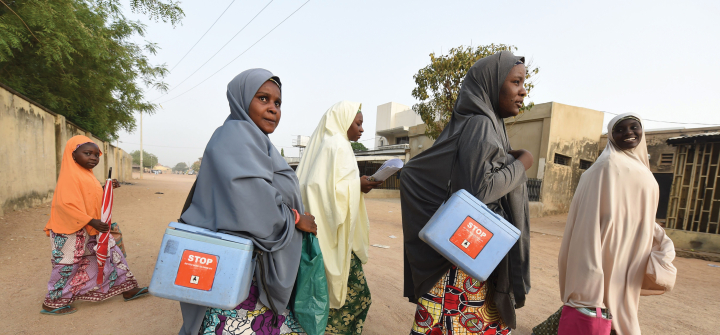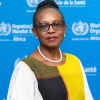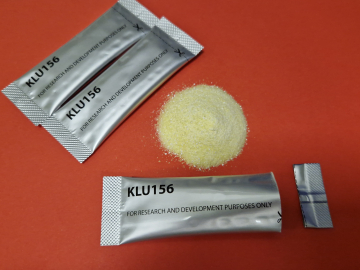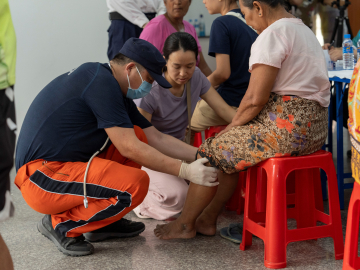The Last Mile: How We’ll Stop All Poliovirus in Africa
Africa reached an outstanding accomplishment 2 years ago in keeping children in the region safe from the threat of paralysis from indigenous wild poliovirus (WPV). We were certified indigenous wild poliovirus-free and celebrated a victory that was decades in the making. Joined effort, commitment, and diligence pushed us through to reach this most significant health milestone.
So, I was utterly shocked in February when I learned that wild polio was back in our region. It was imported from Pakistan through a single case to Malawi, then later linked to 5 cases in Mozambique through August.
Now the entire sub-region is back to work at stopping the transmission of WPV1 in Africa.
The encouraging news for me is knowing that decades of effort against polio have equipped Africa with all the tools required to get rid of the virus. Disease surveillance, immunization, and campaigning expertise at the country level are stronger than ever before. These traditional tools are further supported by innovations like digital geographic information systems and mobile health technologies, which provide insights on how we can improve our efforts. With these effective tools, these innovative systems, and action from countries across the region, we can stop polio for good.
Countries have demonstrated their commitment to concerted action. The Africa Region has shown tremendous leadership in the global preparedness, introduction, and rollout of the novel oral polio vaccine type 2 (nOPV2), a promising new tool to sustainably stop variant polio outbreaks (derived from previous oral polio vaccines), which continue to afflict nations throughout our region. To date, more than 438 million doses of nOPV2 have been administered across 20 African Member States—95% of doses globally—with no evidence of the vaccinations seeding new outbreaks, a critical improvement. Nearly 300 million doses have been in administered in Nigeria alone. I applaud our Member States for acting so quickly.
Moreover, in the challenging context of COVID-19 and WPV, activities supported by WHO and partners vaccinated over 210 million children under 5 with nOPV2 between June 2021 and August 2022. As a result of these strong displays of commitment, WHO recently announced the closure of 32 outbreaks from 13 countries across the region.
While these achievements are laudable, we have room to improve. If each country follows the standard processes to prevent polio’s spread and increases routine immunization campaigns, more countries in the region will obtain positive results.
Malawi offers a strong example of an effective polio outbreak response. Within 48 hours of WPV1 detection in the country, officials declared the outbreak to be a health emergency and, alongside WHO’s Africa Polio Eradication Programme, concerned Member States and Global Polio Eradication Initiative partners, deployed a rapid response team to Malawi and at-risk neighbouring countries.
However, response campaigns have not been uniform in their success, and in August, I facilitated a pledge from ministers of affected countries to improve campaign quality and reach targeted children with vaccines. GPEI has been actively supporting Malawi and neighboring countries to strengthen disease surveillance, including expanding environmental and acute flaccid paralysis surveillance—areas that require increased focus in a quality response.
We have just seen remarkable improvement in Mozambique’s reach in its third round of campaigns. Monitoring tools revealed to have improved 2-fold compared to round 1 campaigns. As a result, more children were reached with vaccinations. Mozambique’s swift turnaround in achieving a quality campaign confirms that Africa is capable of quickly gaining momentum by committing to act with speed and quality, and complete our last mile to polio eradication once and for all.
As I will reiterate during a Thursday polio session alongside the UN General Assembly, if African and global Member States follow the outlined recommendations to reach zero-dose children, and if WHO and partners continue to provide the support they have committed, we will not find ourselves standing in dismay amidst new and continued and polio outbreaks.
Instead, we will dance again, this time in celebration of fully eradicating all forms of polio from Africa and keeping its children safe.
Matshidiso Moeti, MBBS, MSc, is WHO Regional Director for Africa.
Join the 50,000+ subscribers in over 170 countries who rely on Global Health NOW summaries and exclusive articles for the latest public health news. Sign up for our free weekday newsletter, and please share the link with friends and colleagues.
Health workers walk from house to house during a polio vaccination campaign in Hotoro-Kudu, Nassarawa district of Kano, Nigeria. April 22, 2017. Pius Utomi Ekpei/AFP via Getty Images





